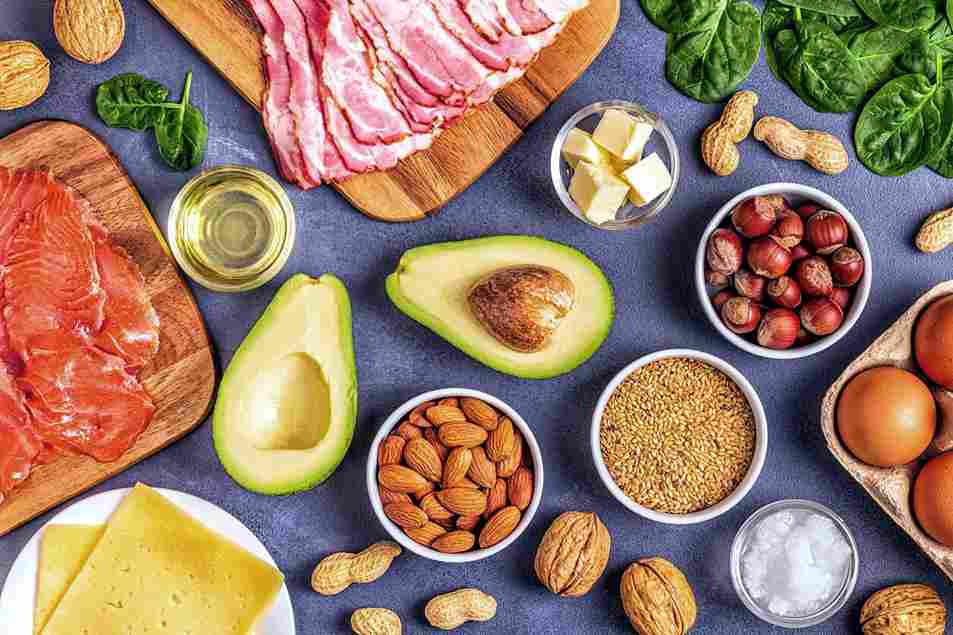The ketogenic diet, a low-carb, high-fat eating plan, has gained popularity not just among those looking to lose weight but also among individuals managing chronic conditions like Type 2 Diabetes. This guide dives into the role of the ketogenic diet for diabetes type 2 in controlling blood sugar levels, improving insulin sensitivity, and potentially reversing the progression of Type 2 Diabetes. Here, we aim to provide a thorough overview of how this diet could be a game-changer for those battling this chronic disease.
Contents
What Happens When a Type 2 Diabetic Goes Into Ketosis?
 When a person with Type 2 Diabetes goes into ketosis, several significant metabolic changes occur in the body as it shifts from using glucose as its primary energy source to using ketones, which are derived from fats. This shift can have both positive and potentially concerning implications for individuals with Type 2 Diabetes. Here’s a closer look at what happens:
When a person with Type 2 Diabetes goes into ketosis, several significant metabolic changes occur in the body as it shifts from using glucose as its primary energy source to using ketones, which are derived from fats. This shift can have both positive and potentially concerning implications for individuals with Type 2 Diabetes. Here’s a closer look at what happens:
- Reduced Blood Sugar Levels: As carbohydrate intake is drastically reduced on a ketogenic diet, blood sugar levels typically decrease. For individuals with Type 2 Diabetes, this can lead to improved blood glucose control. This is a primary goal in managing the condition.
- Improved Insulin Sensitivity: The ketogenic diet can enhance insulin sensitivity. Since the body requires less insulin to process lower amounts of blood sugar, this can help mitigate the insulin resistance that is a hallmark of Type 2 Diabetes.
- Weight Loss: Many people with Type 2 Diabetes experience weight loss when following a ketogenic diet, partly due to reduced calorie intake from eliminating carbohydrates and the body using fat as an energy source. Weight loss can further improve insulin sensitivity and reduce the risk of cardiovascular disease.
- Alteration in Lipid Profiles: While some individuals may see an improvement in their lipid profile (such as increased HDL “good” cholesterol and decreased triglycerides), others might experience elevated LDL “bad” cholesterol levels. The long-term cardiovascular effects of these changes remain a topic of ongoing research.
- Potential Reduction in Medication: Due to improved glycemic control and weight loss, some individuals may reduce their diabetes medication dosage under medical supervision. However, this should be approached with caution.
Entering ketosis can offer potential benefits for people with Type 2 Diabetes, including improved blood sugar control and weight loss. However, it’s essential to approach this dietary change with caution and under medical guidance to manage risks.
How Does Ketogenic Diet For Diabetes Type 2 Work?
The ketogenic diet works for Type 2 Diabetes primarily by altering the body’s metabolism and insulin sensitivity. Here’s a breakdown of how it functions:
Shift to Fat as Primary Energy Source
The ketogenic diet drastically reduces carbohydrate intake and increases fat consumption, prompting the body to shift from using glucose (sugar) as its primary energy source to using ketones. These are molecules produced from fat by the liver when glucose is scarce. This metabolic state is known as ketosis.
Reduced Blood Sugar and Insulin Levels
Since the diet significantly limits carbohydrates, which break down into glucose in the body and raise blood sugar levels, following a ketogenic diet leads to lower blood sugar levels. With less glucose in the blood, the body requires less insulin, the hormone that helps cells absorb glucose. Over time, this can lead to improved insulin sensitivity—meaning the body can manage glucose more effectively with less insulin. This is particularly beneficial for people with Type 2 Diabetes, who often have insulin resistance.
Weight Loss
The ketogenic diet can also promote weight loss by increasing the burning of fat for energy and reducing hunger through its high fat and protein content. Weight loss is beneficial for managing Type 2 Diabetes. Because it can improve insulin sensitivity and reduce the risk of complications associated with obesity and diabetes.
Altered Fat Storage and Utilization
By relying on fat for energy, the body changes the way it stores and utilizes fat. This can lead to reductions in fat deposits. This is beneficial since excess fat, especially around the abdomen, is linked to increased insulin resistance.
Inflammation Reduction
Some research suggests that the ketogenic diet may help reduce inflammation in the body. Chronic inflammation is associated with insulin resistance and Type 2 Diabetes. So reducing inflammation could further improve insulin sensitivity and overall diabetes management.
Hormonal Regulation
The diet may also positively affect hormones related to hunger and satiety, such as ghrelin and leptin. By improving the regulation of these hormones, individuals might experience less hunger and more satisfaction after meals. This can help with caloric intake control and weight loss.
The ketogenic diet for Diabetes Type 2 works by addressing several underlying issues associated with the condition. However, it’s important to note that while the diet can offer significant benefits, it may not be suitable for everyone and should be followed under medical supervision.
What Is The Example Of Ketogenic Diet For Diabetes Type 2?
 Creating a plan of ketogenic diet for diabetes Type 2 involves focusing on low-carb, high-fat foods while maintaining moderate protein intake. The goal is to enter and sustain ketosis, a metabolic state in which the body burns fat for fuel instead of carbohydrates.
Creating a plan of ketogenic diet for diabetes Type 2 involves focusing on low-carb, high-fat foods while maintaining moderate protein intake. The goal is to enter and sustain ketosis, a metabolic state in which the body burns fat for fuel instead of carbohydrates.
Below is an example of a daily ketogenic diet menu tailored for individuals with Type 2 Diabetes:
1. Breakfast
- Spinach and Feta Cheese Omelette: Made with 2-3 eggs, a handful of spinach, and 1 ounce of feta cheese. Cook with olive oil or butter.
- Avocado: Half an avocado on the side for healthy fats.
2. Mid-Morning Snack
- Almonds: A small handful (about 1 ounce) of almonds, which are low in carbs but high in healthy fats and fiber.
3. Lunch
- Grilled Chicken Salad: Grilled chicken breast served over a salad of mixed greens, cucumbers, and cherry tomatoes. Dress with olive oil and vinegar. Add a sprinkle of cheese for extra fat if desired.
- Olives: A few olives as a side for additional healthy fats.
4. Afternoon Snack
- Celery with Almond Butter: 2-3 celery stalks with 1-2 tablespoons of almond butter for a crunch and protein.
5. Dinner
- Salmon with Asparagus: A grilled or baked salmon fillet, seasoned with herbs and lemon. Serve with a side of roasted asparagus tossed in olive oil.
- Cauliflower Mash: Steamed cauliflower blended with cream, butter, and salt to taste, serving as a low-carb substitute for mashed potatoes.
6. Evening Snack
- Cheese and Cucumber Slices: A few slices of cheese and cucumber for a light, keto-friendly snack.
7. Beverages
- Water: Essential for hydration. It can be infused with lemon or mint for flavor.
- Unsweetened Coffee or Tea: Acceptable without sugar. A small amount of heavy cream or unsweetened almond milk can be added.
This example is a starting point. Hence, dietary needs can vary based on individual health goals, nutritional requirements, and medical advice. Always consult with a healthcare provider or a dietitian before starting a new diet.
Considerations In Ketogenic Diet For Diabetes Type 2
 When considering a ketogenic diet for managing Type 2 Diabetes, there are several important factors to keep in mind. Here are key considerations for individuals with Type 2 Diabetes contemplating a ketogenic diet:
When considering a ketogenic diet for managing Type 2 Diabetes, there are several important factors to keep in mind. Here are key considerations for individuals with Type 2 Diabetes contemplating a ketogenic diet:
- Medical Supervision
It’s crucial to consult with healthcare professionals before starting a ketogenic diet, especially for individuals with Type 2 Diabetes. This ensures the diet is tailored to meet individual health needs and to adjust diabetes medication dosages as necessary to prevent hypoglycemia.
- Nutrient Intake
Ensuring a well-balanced nutrient intake is essential. While focusing on fats and reducing carbs, one must not neglect other vital nutrients. Include a variety of nutrient-dense foods to provide vitamins, minerals, and fiber, which are crucial for overall health.
- Hydration and Electrolyte Balance
The ketogenic diet can lead to increased water and electrolyte loss, especially in the initial stages. Maintaining hydration and ensuring adequate intake of electrolytes (sodium, potassium, magnesium) is important to prevent dehydration and imbalances.
- Adaptation Period
The transition to ketosis can come with a range of side effects, often referred to as the “keto flu.” Symptoms may include fatigue, headache, dizziness, and irritability. These typically resolve within a few days to weeks as the body adapts.
- Medication Adjustments
As a ketogenic diet can significantly affect blood sugar levels, adjustments to diabetes medications are often necessary. This should only be done under the guidance of a healthcare provider.
- Heart Health
People with Type 2 Diabetes often have an increased risk of heart disease. Some concerns have been raised about the high intake of saturated fats on a ketogenic diet and its potential impact on heart health.
Starting a ketogenic diet for Type 2 Diabetes involves careful planning and consideration. It’s essential to approach it as part of a comprehensive management plan to ensure its safety and effectiveness.
Conclusion
In conclusion, the ketogenic diet for diabetes type 2 offers a promising approach by significantly reducing carbohydrate intake to lower blood sugar levels and improve insulin sensitivity. While it can lead to weight loss and potentially reduced dependence on diabetes medications, it’s important to approach this diet under the guidance of healthcare professionals.
This ensures that it’s tailored to individual health needs, nutrient intake is balanced, and any potential risks are carefully managed. Need help with Diabetes Diet planning? Join our diabetes diet program and get personalized diet suggestions to help you reverse Diabetes naturally.

